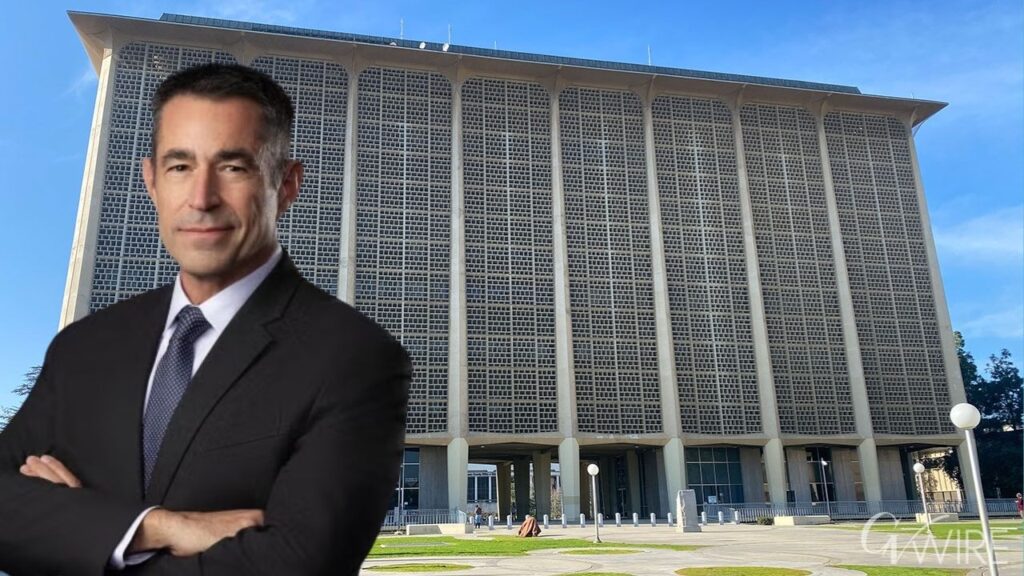Share
|
Getting your Trinity Audio player ready...
|
Just in time to go home for Memorial Day weekend, legislators bulldozed their way through a bunch of bills at the end of this week to beat the even bigger deluge next week, when there’s a Friday deadline to pass remaining bills through the house where they were introduced.

Lynn La
CalMatters
Some of the bills that passed include:
- Concealed carry: When the U.S. Supreme Court struck down a New York state law in 2022, it resulted in the loosening of concealed carry permit requirements. To limit the proliferation of concealed guns, this bill approved by the Senate Thursday would add more gun training requirements and add more public places to the list where Californians cannot carry their concealed weapons.
- Legislative union: The Assembly bill that would give legislative staffers the right to unionize passed off the floor Thursday. It has been amended to ensure that political affiliation will not influence the makeup of bargaining units. Though previous efforts failed, the bill’s author, Assemblymember Tina McKinnor, a Democrat from Inglewood, told CalMatters that this year, “the political will is here.”
- Fossil fuel divestment: Democratic Sen. Lena Gonzalez of Long Beach wants to wind down investments in fossil fuel companies from the pension funds for state employees and teachers. Opponents argue that the bill would reduce investment diversification and returns. And according to the appropriations committee, divesting in these companies would cost the state employee retirement fund $75 million to $125 million in one-time transaction fees and $31 million for teachers.
- Fentanyl crisis: After a marathon 5-hour committee meeting on Wednesday about the fentanyl crisis, the Assembly on Thursday passed several fentanyl-related bills, including legislation that would create a fentanyl task force, prioritize cooperation between state and local law enforcement to crack down on trafficking, increase fines for dealers and expand Narcan accessibility.
- End travel ban: In 2016, California banned state-sponsored travel to states it deemed anti-LGBTQ. Amid criticism that the ban has hindered more people than it helped, Senate President Pro Tem Toni Atkins, a San Diego Democrat, wants to repeal it and instead establish a marketing and advertising campaign promoting “social equity, civil rights and antidiscrimination.”
- Protect abortion providers: To strengthen protections for California abortion providers, this bill proposes to shield them from out-of-state civil action where abortion is illegal, and prohibits the California Department of Health Care Services from automatically suspending providers from the Medi-Cal program if they were dropped from Medicare and Medicaid for providing abortion services.
- Decriminalize psychedelics: Despite the California District Attorneys Association arguing that psychedelics have “no federally accepted medical use and have a high probability of misuse,” the Senate approved a bill to decriminalize certain hallucinogenic substances, which are known to be used by some veterans to treat PTSD, anxiety and depression.
And to stay alive, some bills changed:
- Healthcare minimum wage: Healthcare workers who are advocating for a pay hike are supporting Sen. María Elena Durazo, a Democrat from Los Angeles, and her bill to boost their minimum hourly wage to $25, starting in January (the current minimum wage is $15.50). But the bill has been tweaked to increase pay to $21 an hour by June 2024 and to $25 by June 2025.
- Ebony Alert: To bring more attention and resources to missing Black youth, Sen. Steven Bradford, a Democrat from Gardena, wants to establish an “Ebony Alert” for missing children and young people between the ages of 12 and 25 years old. The bill has been amended with more specific circumstances when the alert can be issued, including if the missing person has a disability or is missing under suspicious circumstances.
Dems Clap Back at Newsom on CEQA
Despite Gov. Newsom’s urging to pass his series of reforms on the California Environmental Quality Act in Richmond on Thursday, just hours later a key Senate budget committee said “no,” report CalMatters’ Marisa Kendall and Julie Cart.
Newsom rolled out his measures, made up of 10 bills, on May 19, just two weeks before the June 2 deadline to pass legislation out of their house of origin. The two Democrats and one Republican on the committee found the package too complex to be considered in such a short time.
Said committee chairperson Sen. Josh Becker, a Democrat from San Mateo: “Seven days is insufficient to vet the hundreds of pages of policy nuance in these proposals.”
Since its enactment in 1970, the environmental conservation law known as CEQA has been leveraged by neighborhood groups and labor groups to thwart or stall big construction projects. Tired of “CEQA abuse” Republicans and Democrats alike have called for its reform. Newsom’s package of legislative measures would have sped up projects by limiting the time opponents can obstruct projects in court with challenges under CEQA.
Newsom’s bills could return as budget trailer bills, however, or he could re-introduce them through policy committees, though that process takes much longer.
Sign up for CalMatters newsletters at this link.
About the Author
Lynn La is the WhatMatters newsletter writer. Prior to joining CalMatters, she developed thought leadership at an ed-tech company and was a senior editor at CNET. She also covered public health at The Sacramento Bee as a Kaiser media fellow and was an intern reporter at Capitol Weekly. She’s a graduate of UC Davis and the Columbia University Graduate School of Journalism.
About CalMatters
CalMatters is a nonprofit, nonpartisan newsroom committed to explaining California policy and politics.
RELATED TOPICS:
Categories

Renee Good’s Relatives Speak to Lawmakers in Washington

















